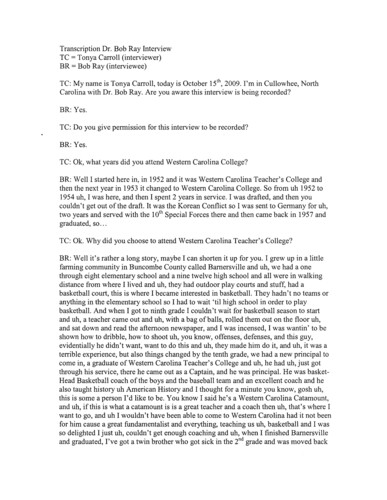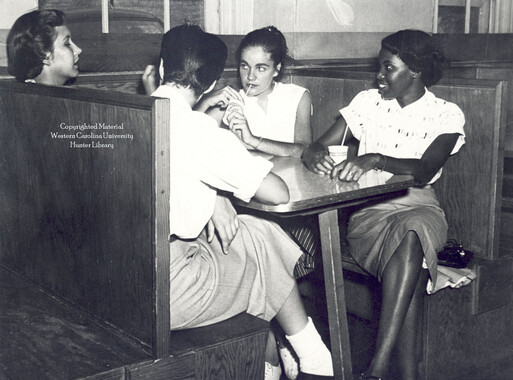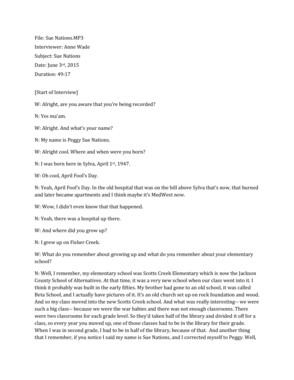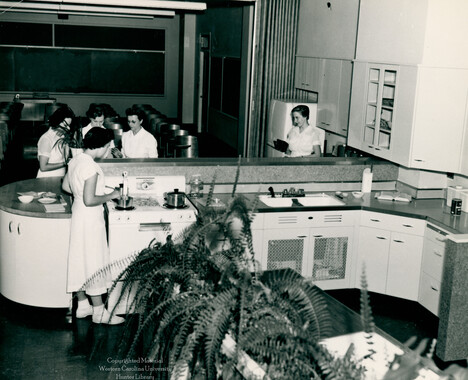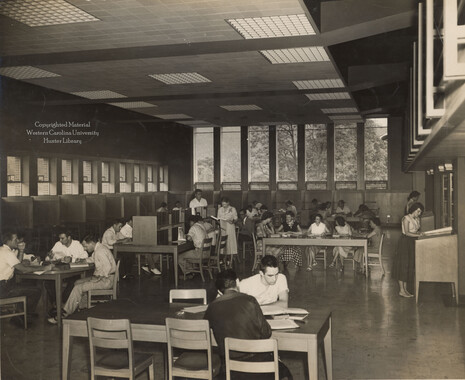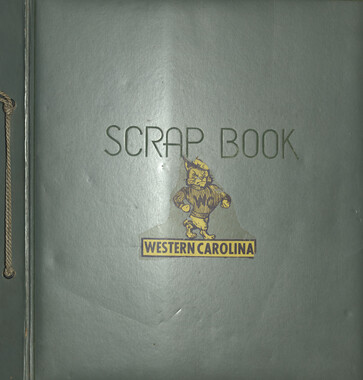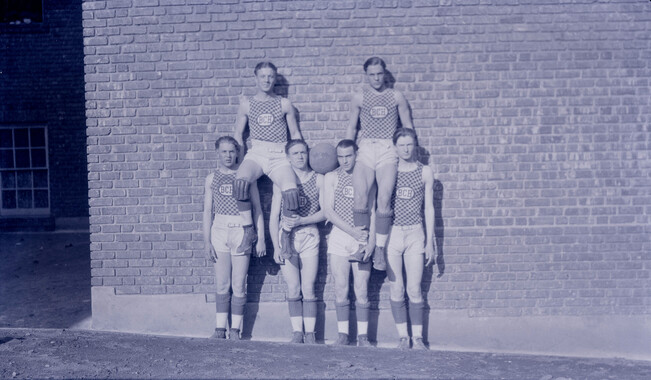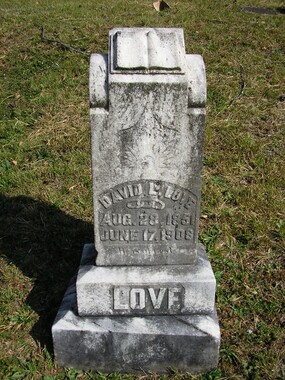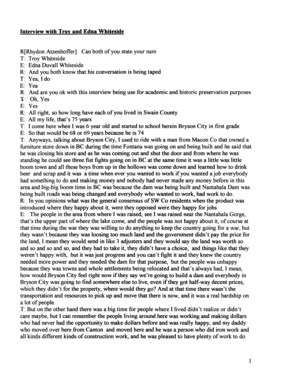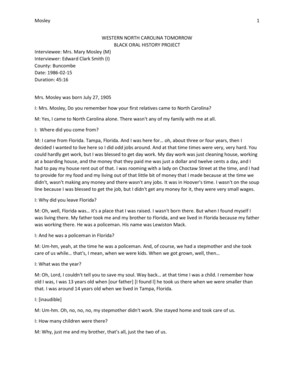Western Carolina University (20)
View all
- Canton Champion Fibre Company (2308)
- Cherokee Traditions (293)
- Civil War in Southern Appalachia (165)
- Craft Revival (1942)
- Great Smoky Mountains - A Park for America (2767)
- Highlights from Western Carolina University (430)
- Horace Kephart (941)
- Journeys Through Jackson (154)
- LGBTQIA+ Archive of Jackson County (19)
- Oral Histories of Western North Carolina (314)
- Picturing Appalachia (6679)
- Stories of Mountain Folk (413)
- Travel Western North Carolina (160)
- Western Carolina University Fine Art Museum Vitreograph Collection (129)
- Western Carolina University Herbarium (92)
- Western Carolina University: Making Memories (708)
- Western Carolina University Publications (2283)
- Western Carolina University Restricted Electronic Theses and Dissertations (146)
- Western North Carolina Regional Maps (71)
- World War II in Southern Appalachia (131)
University of North Carolina Asheville (6)
View all
- 1700s (1)
- 1860s (1)
- 1890s (1)
- 1900s (2)
- 1920s (2)
- 1930s (5)
- 1940s (12)
- 1950s (19)
- 1960s (35)
- 1970s (31)
- 1980s (16)
- 1990s (10)
- 2000s (20)
- 2010s (24)
- 2020s (4)
- 1600s (0)
- 1800s (0)
- 1810s (0)
- 1820s (0)
- 1830s (0)
- 1840s (0)
- 1850s (0)
- 1870s (0)
- 1880s (0)
- 1910s (0)
- Appalachian Region, Southern (15)
- Asheville (N.C.) (11)
- Avery County (N.C.) (1)
- Buncombe County (N.C.) (55)
- Cherokee County (N.C.) (17)
- Clay County (N.C.) (2)
- Graham County (N.C.) (15)
- Great Smoky Mountains National Park (N.C. and Tenn.) (1)
- Haywood County (N.C.) (40)
- Henderson County (N.C.) (5)
- Jackson County (N.C.) (131)
- Knox County (Tenn.) (1)
- Macon County (N.C.) (17)
- Madison County (N.C.) (4)
- McDowell County (N.C.) (1)
- Mitchell County (N.C.) (5)
- Polk County (N.C.) (3)
- Qualla Boundary (6)
- Rutherford County (N.C.) (1)
- Swain County (N.C.) (30)
- Watauga County (N.C.) (2)
- Waynesville (N.C.) (1)
- Yancey County (N.C.) (3)
- Blount County (Tenn.) (0)
- Knoxville (Tenn.) (0)
- Lake Santeetlah (N.C.) (0)
- Transylvania County (N.C.) (0)
- Interviews (314)
- Manuscripts (documents) (3)
- Personal Narratives (7)
- Photographs (4)
- Sound Recordings (308)
- Transcripts (216)
- Aerial Photographs (0)
- Aerial Views (0)
- Albums (books) (0)
- Articles (0)
- Artifacts (object Genre) (0)
- Biography (general Genre) (0)
- Cards (information Artifacts) (0)
- Clippings (information Artifacts) (0)
- Crafts (art Genres) (0)
- Depictions (visual Works) (0)
- Design Drawings (0)
- Drawings (visual Works) (0)
- Envelopes (0)
- Facsimiles (reproductions) (0)
- Fiction (general Genre) (0)
- Financial Records (0)
- Fliers (printed Matter) (0)
- Glass Plate Negatives (0)
- Guidebooks (0)
- Internegatives (0)
- Land Surveys (0)
- Letters (correspondence) (0)
- Maps (documents) (0)
- Memorandums (0)
- Minutes (administrative Records) (0)
- Negatives (photographs) (0)
- Newsletters (0)
- Newspapers (0)
- Occupation Currency (0)
- Paintings (visual Works) (0)
- Pen And Ink Drawings (0)
- Periodicals (0)
- Plans (maps) (0)
- Poetry (0)
- Portraits (0)
- Postcards (0)
- Programs (documents) (0)
- Publications (documents) (0)
- Questionnaires (0)
- Scrapbooks (0)
- Sheet Music (0)
- Slides (photographs) (0)
- Specimens (0)
- Speeches (documents) (0)
- Text Messages (0)
- Tintypes (photographs) (0)
- Video Recordings (physical Artifacts) (0)
- Vitreographs (0)
- WCU Mountain Heritage Center Oral Histories (25)
- WCU Oral History Collection - Mountain People, Mountain Lives (71)
- Western North Carolina Tomorrow Black Oral History Project (69)
- A.L. Ensley Collection (0)
- Appalachian Industrial School Records (0)
- Appalachian National Park Association Records (0)
- Axley-Meroney Collection (0)
- Bayard Wootten Photograph Collection (0)
- Bethel Rural Community Organization Collection (0)
- Blumer Collection (0)
- C.W. Slagle Collection (0)
- Canton Area Historical Museum (0)
- Carlos C. Campbell Collection (0)
- Cataloochee History Project (0)
- Cherokee Studies Collection (0)
- Daisy Dame Photograph Album (0)
- Daniel Boone VI Collection (0)
- Doris Ulmann Photograph Collection (0)
- Elizabeth H. Lasley Collection (0)
- Elizabeth Woolworth Szold Fleharty Collection (0)
- Frank Fry Collection (0)
- George Masa Collection (0)
- Gideon Laney Collection (0)
- Hazel Scarborough Collection (0)
- Hiram C. Wilburn Papers (0)
- Historic Photographs Collection (0)
- Horace Kephart Collection (0)
- Humbard Collection (0)
- Hunter and Weaver Families Collection (0)
- I. D. Blumenthal Collection (0)
- Isadora Williams Collection (0)
- Jesse Bryson Stalcup Collection (0)
- Jim Thompson Collection (0)
- John B. Battle Collection (0)
- John C. Campbell Folk School Records (0)
- John Parris Collection (0)
- Judaculla Rock project (0)
- Kelly Bennett Collection (0)
- Love Family Papers (0)
- Major Wiley Parris Civil War Letters (0)
- Map Collection (0)
- McFee-Misemer Civil War Letters (0)
- Mountain Heritage Center Collection (0)
- Norburn - Robertson - Thomson Families Collection (0)
- Pauline Hood Collection (0)
- Pre-Guild Collection (0)
- Qualla Arts and Crafts Mutual Collection (0)
- R.A. Romanes Collection (0)
- Rosser H. Taylor Collection (0)
- Samuel Robert Owens Collection (0)
- Sara Madison Collection (0)
- Sherrill Studio Photo Collection (0)
- Smoky Mountains Hiking Club Collection (0)
- Stories of Mountain Folk - Radio Programs (0)
- The Reporter, Western Carolina University (0)
- Venoy and Elizabeth Reed Collection (0)
- WCU Gender and Sexuality Oral History Project (0)
- WCU Students Newspapers Collection (0)
- William Williams Stringfield Collection (0)
- Zebulon Weaver Collection (0)
- African Americans (97)
- Artisans (5)
- Cherokee pottery (1)
- Cherokee women (1)
- College student newspapers and periodicals (4)
- Education (3)
- Floods (13)
- Folk music (3)
- Great Smoky Mountains National Park (N.C. and Tenn.) (1)
- Hunting (1)
- Mines and mineral resources (2)
- Rural electrification -- North Carolina, Western (2)
- School integration -- Southern States (2)
- Segregation -- North Carolina, Western (5)
- Slavery (5)
- Sports (2)
- Storytelling (3)
- World War, 1939-1945 (3)
- Appalachian Trail (0)
- Cherokee art (0)
- Cherokee artists -- North Carolina (0)
- Cherokee language (0)
- Church buildings (0)
- Civilian Conservation Corps (U.S.) (0)
- Dams (0)
- Dance (0)
- Forced removal, 1813-1903 (0)
- Forest conservation (0)
- Forests and forestry (0)
- Gender nonconformity (0)
- Landscape photography (0)
- Logging (0)
- Maps (0)
- North Carolina -- Maps (0)
- Paper industry (0)
- Postcards (0)
- Pottery (0)
- Railroad trains (0)
- Waterfalls -- Great Smoky Mountains (N.C. and Tenn.) (0)
- Weaving -- Appalachian Region, Southern (0)
- Wood-carving -- Appalachian Region, Southern (0)
- Sound (308)
- StillImage (4)
- Text (219)
- MovingImage (0)
Interview with Dr. Bob Ray
Item
Item’s are ‘child’ level descriptions to ‘parent’ objects, (e.g. one page of a whole book).
-
Bob Ray was a student at Western Carolina College from 1952 to 1954 before he was drafted to serve in the Korean Conflict and sent to Germany. He returned in 1957 and graduated thereafter. In this interview, Ray tells about his life as a student-athelete at Western; playing basketball under Coach Gudger; the role of sports in the social life of the campus; and playing with the German national basketball team, while in service, as part of a US Army initiative to improve relations between the countries.
-
-
Transcription Dr. Bob Ray Interview TC = Tonya Carroll (interviewer) BR =Bob Ray (interviewee) TC: My name is Tonya Carroll, today is October 151 \ 2009. I'm in Cullowhee, North Carolina with Dr. Bob Ray. Are you aware this interview is being recorded? BR: Yes. TC: Do you give permission for this interview to be recorded? BR: Yes. TC: Ok, what years did you attend Western Carolina College? BR: Well I started here in, in 1952 and it was Western Carolina Teacher's College and then the next year in 1953 it changed to Western Carolina College. So from uh 1952 to 1954 uh, I was here, and then I spent 2 years in service. I was drafted, and then you couldn't get out of the draft. It was the Korean Conflict so I was sent to Germany for uh, two years and served with the 101 h Special Forces there and then came back in 1957 and graduated, so ... TC: Ok. Why did you choose to attend Western Carolina Teacher's College? BR: Well it's rather a long story, maybe I can shorten it up for you. I grew up in a little farming community in Buncombe County called Barnersville and uh, we had a one through eight elementary school and a nine twelve high school and all were in walking distance from where I lived and uh, they had outdoor play courts and stuff, had a basketball court, this is where I became interested in basketball. They hadn't no teams or anything in the elementary school so I had to wait 'til high school in order to play basketball. And when I got to ninth grade I couldn't wait for basketball season to start and uh, a teacher came out and uh, with a bag of balls, rolled them out on the floor uh, and sat down and read the afternoon newspaper, and I was incensed, I was wantin' to be shown how to dribble, how to shoot uh, you know, offenses, defenses, and this guy, evidentially he didn't want, want to do this and uh, they made him do it, and uh, it was a terrible experience, but also things changed by the tenth grade, we had a new principal to come in, a graduate of Western Carolina Teacher's College and uh, he had uh, just got through his service, there he came out as a Captain, and he was principal. He was basketHead Basketball coach of the boys and the baseball team and an excellent coach and he also taught history uh American History and I thought for a minute you know, gosh uh, this is some a person I'd like to be. You know I said he's a Western Carolina Catamount, and uh, if this is what a catamount is is a great teacher and a coach then uh, that's where I want to go, and uh I wouldn't have been able to come to Western Carolina had it not been for him cause a great fundamentalist and everything, teaching us uh, basketball and I was so delighted I just uh, couldn't get enough coaching and uh, when I finished Barnersville and graduated, I've got a twin brother who got sick in the znd grade and was moved back uh, a year, so I was always a year ahead of him but I told him I said, uh when I go, when we go to college, I'll wait and go with you. So I did this and my parents uh, were urn, my dad was a carpenter and we had with my twin brother and myself graduating we already had, there were seven of in the family but uh, the others had married and gone but there were three of us left and Lauren my brother was in going to college in Florida, and uh, I had made up my mind in the ninth uh, to 1oth grade when this coach came in Hugh Tumberlin that I was going to go to Western and become a teacher/coach, and uh, anybody ask me what I was gonna do, I, that's what I would tell them. Well when I graduated there 2 coaches from Mars Hill College came over and sit down with my parents and myself and we only live about fifteen miles away, offered me a full scholarship TC: Wow! BR: and I thought gosh, how can I tum this down, but I, I didn't, didn't want to go to Mars Hill, so I told them that uh, uh, the coaches I told them that uh, the coaches I told them I'm going to Western Carolina to become a teacher/coach, and they understood and this type thing, and my parents uh didn't say anything either but uh, I thought gosh I'll have to borrow money probably to send me and three were in school at the time, so when I came to Western, I came on a mission, I uh, I come on out to see Coach Gudger, and asked him, uh, if he had a scholarship and he talked to me and he said well Bob, he said, I don't have one right now but if you come here and help me, I'll help you, so I was a walk on. Found out later that Ron Rogers the All American teammate that I played with, the same thing had happened to him, that he said if you come help me I'll help you. But uh, uh, I forgot what I was gonna say there, uh, about Ron. Anyway uh, I worked in a uh, dining hall, that first quarter thank goodness we were on quarters, and uh, in order to help earn money cause it didn't want mom and dad to have to fork out a lot of extra money for me or anything and I had been working some on the year that I was off to save some money and, I come, not just to make the team, I come to be a starter. Fortunately, I beat out a senior and become a starter during my freshman year and uh, for the next four years it was a full, full ride. TC: (Laughs) ok. BR: So that's uh, why I wanted to come to Western was to be like Hugh Tumberlin my old basketball coach. TC: What did you major in? BR: Then in the fifties you had to have a double major. TC: Ok. BR: So I majored in Health, Physical Education Recreation and Science. So, pretty, pretty tough majors. TC: What position did you play on the team? BR: My freshman year I was center, starting center, and this uh, picture that I showed you here (it is a photography of the five starters his freshman year) I was starting, the tallest member on the starting team and we only had one coach who was Coach Gudger. Then for the next three years with the recruitment of bringing in bigger, taller people I played forward uh, at Western, which was kind of funny, in high school I played guard, so it all changed when I got here, yeah. TC: You said your coach was Coach Gudger? BR:Umhmmm. TC: Can you tell me about your experiences with him? BR: Well he was a taskmaster, we really trained and got in condition, we did strength, quickness drills and uh, was an excellent coach but uh, and uh, some of the players didn't like Coach Gudger uh, because he ran us so much and trained us so much and we practiced sometimes two times a day and this type thing and really a great, great basketball coach, he really knew exactly what he was doing. Since I'd come on a mission I bought in 100 per cent into his system. And uh, you know, I think this is what got me the starting position, and then .... TC: Can you tell me about some experiences with other teammates? BR:uh, TC: We're at number nine. BR: Yeah, well, (pause) Paul Taylor who was a guard along with Ron Rogers, All American Ron Rogers, and Paul got his doctorate degree and went on to work for the state department in North Carolina. And uh, and Ned Strayla uh the uh, the other starter there a guard, he uh, we've all stayed very close, Ron and Paul, had been back several times and then we continued to see each other and uh, Susie and I, my, my wife, started about five years ago to endow a scholarship uh and in honor of my high school coach and my parents, and uh, when Ron Rogers heard about it, he sent a gift of five hundred dollars. TC:Wow. BR: The fund now is over fifty thousand and uh, uh, it, it will continue to grow but uh, that's the kind of the teammates I had. TC: So you all were pretty close and still remain friends? BR: oh yeah, yeah TC: That's good. BR: Didn't have a nickname. TC: You didn't? Ok. BR: No. and the uh, uh, awards that I've received, my junior year I was all conference. In the North State Conference, and uh, we were runners up in the conference that year too, as far as, we didn't win any championships other than, some of the championships that we played in, some of the tournaments we played in other than the conference tournament, we won some of those but uh. TC: When you played was it really important to try to win the tournaments and the championships? BR: Uh, yeah see then, there was no thought of a hall of fame, that you had to make, nor was anyone really trying to make all American or all conference or anything, we were playing to win, as a team and uh sometimes I think today players think of themselves too much instead of the team effort to go ahead and try to make accolades for themselves, I was really surprised to make all conference but uh, I averaged about 17 points that year so ... TC: Ok. Can you tell me about your experiences being a student and an athlete? BR: Well as a student, and having a double major, and particular in having to travel so much uh, we'd have to take uh, our textbooks and materials with us and study while we were on a trip. Because some days uh, we would go all the way to East Carolina, and we'd stop along the way and play several different teams as we would go, and may be gone for two weeks. TC:Wow! BR: yeah, and we'd play a 2 game, a 2 game, 2 games down at East Carolina, next year they would come to Western to play 2 games up here and stay here. Because the travel was so bad and I'm getting into some of your other questions you're gonna ask but. TC: Its fine. BR: You can take Lenoir-Rhyne for instance, from Hickory in uh, the early fifties and we didn't have interstates and the only road to Asheville was the old road that goes up and winds up the mountain to uh, Hazelwood, which you had to go through Waynesville, you had to go through Canton, you had to go through West Asheville, Asheville, Swannanoa you know, Black Mountain, and down the mountain uh, from Black Mountain down there the old road that went down to uh, uh, Old Fort. And then you had to go through all these small towns to get down to Hickory. We would get up and they would serve us an early breakfast at seven o'clock in the morning in the cafeteria, then we'd get in our station wagons, three station wagons and drive as quickly as we could and they had to hold lunch for us down there to their cafeteria 'til one o'clock, now that's uh, about six hours, of driving to go to Hickory. So you see why, why we played two games for some of these and then they would come back to play us for two games so I thought you might be interested in that. TC: What did being an athlete mean to you? BR: Well, gosh it, it meant, a means to an end, it meant in order to achieve what I wanted to achieve to get a, a college education and become a teacher/coach and uh, uh, and I've always, I always loved to play basketball uh, my twin brother was always uh, head and shoulders, I'd come up to about his shoulders until, the ninth grade is when I had a growth spurt and uh, when I came back uh, for the tenth grade there when the new principal came in people were saying gosh how you've grown, how you've grown, and I said well yeah, I've grown and I must have grown three or four inches over that summer and in there and, it didn't dawn on me till I looked at my ninth grade teacher and uh, I was looking down at her. TC: (laughs) BR: but I didn't answer that question, what was the question there? TC: Just what it meant to you, to be an athlete? BR: ah, well maybe I got off track there a little bit, (laughs) TC: Its ok, you told me a little bit earlier that you wanted to go there to be like your old coach? BR: oh yeah, yeah that uh, well it was a means to an end, to be able to accomplish that, and really, what, what happened was that's uh, uh, it was a dream that I had, to be like him, and uh, and it finally came to fruition and uh, I was able to uh, coach and even come back to my alma mater here and coach. TC: Were the teachers helpful when you had to be gone for two weeks? BR: They were very understanding yes, and uh, you still had to do the work I mean it wasn't uh, they didn't let you ride just because you're an athlete and uh, I thank them for that because I was able to go to the University of North Carolina on assistantship and uh, get a masters and uh, then later on go to Georgia and get a doctorate so you know, they gave me good training. TC: You've already told me a little bit about when you traveled to the away games, but urn, can you talk a little bit more about maybe how the fans treated you, or the best teams you played? BR: Well the (clears throat) yeah the fans were, were always great, and the old North State Conference we had uh, three state schools in this North State Conference during this time, and that was Appalachian, East Carolina, and Western Carolina. And East Carolina started as East Carolina Teacher's College and it was called E-C-T -C and Western was called Whee-C-T -C so uh, uh, now I forgot your question again. TC: How did the fans treat you when you traveled? BR: The second part of that, fans were great what was ... TC: Uhhmmm, the best teams that you played? BR: Oh gosh, there were many teams that were really good teams and uh, uh, East Carolina came up here to Western to play us and they were one, at the time they were one of the seven undefeated teams in the country and uh, they played a two game schedule, and they, won the first game uh, they beat us not by a great deal, and we were playing in the old Breese gym, where the dance studio is now and that gym was, the floor of that gym was, on a concrete slab, so it did not give, and this happened many times to teams coming in, that they would come out the first night and really be playing hard running up and down. Second night they would come out, some were taped up all the way to their knee because of shin splints that they would get from jarring on the floor but uh, it wasn't the case on this uh, game, cause I think there was only one game that we played them that we went down there to play them again that year on some trip we took, but uh, uh, we beat them a hundred and two to ninety seven, and uh, uh, in old Breese gymnasium that year and that was really a, a, an upset because they had some great players on the team, Bobby Hodgins who was the guy that I had to guard, and he was about 6'6", 6'7", and he also played on their football team and he came back up here to play on the football team, we were running an offense that ifuh, the defensive man overplayed you, you could cut behind a backdoor and get a pass and get a lay up. And I did that a couple three times on Bobby Hodgins, he was trying to cut me off from going to the ball and he come down the court and said, "Ray you do that again he said I'm gonna hit you just like a volleyball," and I said "Bobby, you gotta catch me first." TC: (laughs) BR: Well I told some of my friends on the Catamount football team about this and they said we'll fix him. He played defensive end and there was couple of them that hit kept hittin' him around the knees during the game and they said he had tears comin' out of his cheeks before the game was over. TC: Wow! BR: He never knew that I did that because if we played him again he would probably try to kill me. (laughs) TC: (laughs) So you ruined their perfect record that year when they came to play you up here, you beat East Carolina? BR: Well yeah, that's one of many, there were a lot of games that uh, the game that we should never have won was against Wofford College they had, had this 6"1 0 L.B. Neil that uh, Coach Gudger said that uh, told us that ififwe beat Wofford in Reid Gym there, I mean Breese Gym, underneath there's a swimming pool, and that's where our dressing rooms were around the pool there. And he told us he said "If you beat Wofford you can throw me into the pool after the game and this is where Paul Taylor shot the shot that went in and here's Coach Gudger after he got out, see his arms all wet. We threw him in. (had a photography of Coach Gudger after he was thrown in the swimming pool) TC: Wow! (laughs) BR: And Jim Jordan one of the other players jumped in with him so uh ... TC: Did your team have any pregame rituals? BR: Uh no, uh, except you know we always had pregame and after game meals but uh, that's was the only TC: What types of food would they feed you before the game? BR: Oh gosh, it wasn't too heavy a meal, I can remember after the games a lot of the time they served you steaks so we wouldn't eat a great deal, prior to the uh, we'd eat around 4 o'clock I guess to play that night. TC: When you traveled to away games, would their cafeteria feed you after the games too? BR: Uh some would, and some had a, restaurants that they would go to where they would pay the restaurant you know to serve after game meals cause it was an exchange, when they came up here we took care of their meals and when we went there they took care of ours so, that's the way it worked out. TC: When you coached at Western was it the same? When other teams would come here was there that hospitality? BR: You know I'm not sure, uh, they would stay at different hotels, motels and this type thing and take care of their own meals so that's probably what Western did when they traveled, would be to take care of their own meals, and uh ... TC: When you played basketball and you would travel where did you stay? BR: A lot of times we would stay uh, on the campus in some of the uh, dorms, or wherever they would have team quarters that you could stay. And uh, I know down at Atlanta Christian we stayed uh, in a basement to the gymnasium there just below where the floor was and this type thing. And uh, some were pretty good; others were just barely adequate I would say. TC: So when other teams would come to Western where would they stay? BR: Uh, I'm not sure, at this point, I don't think we had a place on campus for them, uh, well I know the, yes we did, over at the old Memorial Stadium there now and back where the library is and the back of the science building is there, they did have football quarters where the football, visiting football teams would come in and they would stay there, and they probably put the basketball teams there too. TC: Ok. Can you tell me your best memory as an athlete? BR: Oh, probably uh, making all conference. And one of the highlights was in 1957 when they uh, uh, built, uh, Reid Gymnasium and dedicated it, we had a dedication game and we played the University ofNorth Carolina Chapel Hill. They came to Western ranked number one in the nation and undefeated. And they left undefeated. I told this to some of my classes that uh, about this and they would ask uh, who won? I said well let me put it this way, they were 34 and 0, that year when they won the national championship but that was a thrill to get to play against them and to uh, guard some of the players and uh, uh, it's something that I'll always remember and cherish that they would come up here and do this for us. I talk, uh, when I went to Carolina to work on a masters I talked to their coach Frank McGuire and he made a comment about Reid Gymnasium at that time and this was in 1957, he said, we've been trying to get a gym like this at Carolina and they were still playing what's the old Woolen Gym then and now you look at the Dean Dome and of course we've got the RAC, the Recreational Activities Center, which is a very good facility as well but uh, it's amazing uh, how much we have grown since uh, I started in '52, we had approximately 600 students in 1952 and now we've got 9,427 I think enrolled this year and it's grown that much and uh, everything on uh, the campus, was really up on the hill they just started the Stillwell classroom Building and Hunter Library and uh at the time I started the classroom building was over where uh, where Brown Cafeteria is now, and of course they tore that down once they got into Stillwell classroom Building, and now its amazing to me to watch old alumns come back get lost on campus. They don't know their way around and the growth spurt that we're in now is unreal, it is great you know. TC: Can you tell me some of your worst memories? BR: Well, when I came back from service and I was majoring in Physical Education and one of the requirements for Physical Education major was to participate in intramurals uh, and I was out prior to the season playing in a tag football game and it was kind of a misty rain, and I went into a full split and uh, pulled some muscles on the inside of the leg there that attaches to the leg and in the hip bone and uh, I tried to play through it and it just kept getting so bad that I couldn't hardly lift my leg and had to take heat and sound treatments with Dr. Durr our team physician in there and it was about halfway through the uh, season, before I could really start playing again with the team so uh, having to sit on the bench some while this was uh, healing, was new to me and I hated it, I wanted to get in so that's the worst. TC: Do you remember playing with a man named Phillip Smith? BR: Phil Smith, yep, he, he told me he said I'm going to be chief of the Cherokee Indians one day and that's where he got his nickname as far as I know, we called him Chief, and I roomed with him one year or a couple of semesters or quarters there or however long it was, great guy, good basketball player, he didn't get to play a lot, but one thing he excelled at was clogging, have you ever seen him clog? TC: No, he didn't tell me that. BR: Oh gosh he was great on that, and a fun guy to be with, and I can remember when he was dating Dee Thompson and he would come in after dates and tell me how great she was and this type thing so I figured probably they would get married and they did so. TC: In your opinion what kind of a teammate was he? BR: He was a good teammate, yeah, he didn't complain about not being able to start or play or anything. Anything you ask him to do he got in and uh, gave it his best. So yeah, a good teammate. TC: So he didn't have a bad attitude? BR: Oh no, no. TC: Do you have any stories that you want to tell me about him? BR: I've got some stories but I can't tell you about them. (laughs) TC: Ok. (laughs) Did you learn anything about Cherokee culture from Phillip Smith? BR: Cherokee culture, no, not a great deal, though we talked a great deal about Indian stickball, and uh, we didn't have, it was all books and basketball and that's uh, what uh, took our time, mostly, and trying to stay in school and pass and this type thing so ... yeah. TC: Ok, are there any other stories you want to tell me? BR: Hhmmm, well none that I can think ofuh ... TC: Do you remember when the Arkansas Travelers came to Western? BR: Oh yeah, we played them yeah and uh, uh, gosh there was another women's team that came there too, that came and played, and we played these as an exhibition game before the season had started and this type thing and they, they did this to make money, but the officials would let them get away with murder as far as holding and this type thing. We always would beat them but uh, they would make it close you know so, but it was a lot of fun. TC: What are some of the things that Coach Gudger would say to you to get you ready to play in the game? BR: Uh, he would just go over the game plan that we had and uh, wouldn't try to psyche us up or anything we approached most games the same way. He was a great coach for doing that I mean, when you played big games we just treated it like regular games, you approached it like that and uh, I really enjoyed playing for him and, Ron Rogers told me one time in a practice, he got on me during some rebounding drills and one of the things he said, Ray, a big girl could out rebound you, you know he was trying to get me juiced up to do it but it went in one ear and out the other. Ron was captain of the team then, and he goes to coach Gudger and he says listen coach, he said, you better get offRay's back, and he said how's that and he said If you'll notice you didn't start winning until he come so. And that was true, he didn't have winning seasons 'til I came, this may have been one of the reasons why he invited me back as his first full time assistant coach in 1963 and that was the team that went to the national championship so. TC: So he didn't have an assistant coach until he invited you back? BR: Full time, he used some graduate assistants and some people to help him but I was brought in as an assistant coach and instructor in the department of Health and Physical Education. And uh, uh, during my stay here I've worked my way up through all the uh prophesorial ranks, and ended up a full professor and department chair. TC: Well that's all my questions, you sure you don't have anything else? BR: Cant think of anything. TC:Ok. BR: Well, I was in school when it was Western Carolina Teacher's College so in '52 then from '53 to' 67 it was Western Carolina College and during part of this time is when I played but when I came back to coach in '63 I was here also when it changed to Western Carolina University and I remember people saying that Western should remain small, a small college and have a cap of about five thousand students and the others there was talk of making it a university and others said Western's not a university you know and now as we look back uh my alma mater is assaying if you could see me now! At what a great university it's turned out and uh, what a great university it's going to become. (at this point his wife Susie comes in and says tell her about Germany) BR: She don't wanna know about Germany. (Susie and me say yes) BR: That isn't about Western's history (Susie says it is, just tell her) TC: It's fine tell me, I'm a history major so I love to listen about anything. BR: (laughs) Uh, well when I was assigned to the lOth Special Forces there and during that two years uh, they issued the first issue of the Green Beret and I've got a one of the first issues and it's a little French beret it's not like the big berets that they have now that come all the way down, but uh they had a urn, this is totally irrelevant to what you're doing TC: That's ok. BR: but they had a 1oth Airborne, which was different than the 1oth Special Forces, 1oth Airborne to come over there to Germany and this was in the uh, late mid 50s late to mid 50s an they had a lot of young soldiers there that went out and got drunk and caused a lot of trouble and this type thing so the uh, the commanding officer Colonel Edwin of the lOth Special Forces wanted us to improve German-American relations so one of the uh, uh, Majors who was in charge of recreation and this type thing came to me and asked me if I wanted to play and coach with the German National team and I was playin' with a group team there I said well sure and they gave me administrative leave to travel all over Germany there and some parts of Austria to play with this team and it was a sports club uh, SB sports variety, which was a sports club and they could have two foreigners on a team. Two of us from the lOth Special Forces uh, went to play with them and I helped this guy coach and we went all the way to the Southern Germany Finals of the before we lost out uh, that year and I had a very good team and got to go back uh, and see some ofthem uh and one ofthem owned, the coach owned a jewelry store and that clock up there uh, he let me have that for almost nothing and I brought it back and uh, so it's a German Cuckoo Clock. TC: So was it hard to play with 'em? Did they speak English? BR; Well, yeah they spoke fairly good English all of 'em uh, urn I learned some German, but I would've learned more if they hadn't been able to speak it. But uh, the German people were the nicest people I've ever met. If they liked you, they'd do anything in the world for you and uh, I really uh, miss that part of it as far as not being able to uh, keep in touch with some of 'em. I know that one of 'em died uh, and I the others were overseas when I was there one was in Japan and another was well I forget where the other one was but they'd travel all over the world, but uh, great fun time uh, playing with 'em. But uh, when I got ready to come back to the United States and uh, uh, go back to school and get out of the service uh, the uh lOth Special Forces Group there gave me a Certificate of Achievement, which was the highest award they could give in there for I guess predominantly the work that I had done with the uh, the uh, Germans there and also running I was in charge of their message center I ran their message center and for two years we didn't receive a gig at all on any inspection that we had so, fun time. TC: Were their rules the same? Did they have any different rules? BR: Uh yeah, uh it was funny uh, they played kinda like you're playing soccer, they played you man to man and would run all over the court with you all the time in there until I got mine not to do this, we'd come down and set up with our defensive zone and this type thing, which made it difficult for them because they were just wanted to go out and just run, run, run run. And uh, we would use picks on them and this type thing to get open but uh, great, great memories.
Object
Object’s are ‘parent’ level descriptions to ‘children’ items, (e.g. a book with pages).
-
Bob Ray was a student at Western Carolina College from 1952 to 1954 before he was drafted to serve in the Korean Conflict and sent to Germany. He returned in 1957 and graduated thereafter. In this interview, Ray tells about his life as a student-athlete at Western; playing basketball under Coach Gudger; the role of sports in the social life of the campus; and playing with the German national basketball team, while in service, as part of a US Army initiative to improve relations between the countries.
-
